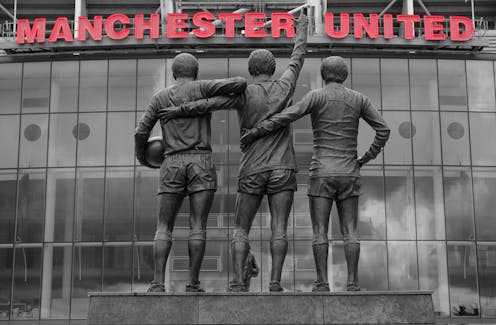the business tactics that could lead to a record multi-billion-pound sale
- Written by Christina Philippou, Principal Lecturer, Accounting and Financial Management, University of Portsmouth

It seems that another item can now be added to the long list of things that are getting more expensive: football clubs. The bids coming in to buy Manchester United, reportedly in the region of £4.5bn[1] (the owners are said to want £6bn) would make it the largest amount ever paid for a club.
Given that the current US owners, the Glazer family, bought Manchester United in 2005 for around £800 million[2], the current valuation makes it unsurprising that a sale may be on the cards[3].
But can a football club, even one as famous as Manchester United, really be worth £6bn?
For comparison, in 2021 one of its rivals, Newcastle United, sold for a fraction of that sum, at around £300 million[4]. Yet given that Newcastle had been bought for £133 million in 2007[5] (about £200 million in today’s money), that controversial sale[6] was still seen as providing a decent return.
But it was Chelsea, sold in May 2022, which started the sale bonanza among the biggest British clubs. Manchester United, Liverpool[7] and Tottenham Hotspur[8] have all been linked to potential sales since then.
Chelsea had been bought for £140 million[9] by Roman Abramovich in 2003, when it was struggling financially. Two decades later, its £2.5 billion[10] price was achieved despite the club being what is known as a “distressed asset” (something that needed to be sold because Abramovich had been sanctioned by the UK government[11]), meaning that bids were probably lower than if the sale had been on the open market.
Crucially though, Chelsea had also become a more impressive club, winning a number of trophies (two Champions League, two Europa League, five Premier League titles and five FA Cups). (The profit from the Chelsea sale is now earmarked for humanitarian causes in Ukraine[12].)
Another important element behind a club’s value is, of course, how much any potential owner is willing to pay. Research suggests that owning a football club is generally something that loses money[13], so owners normally fit one of three categories.
First, there are those who view clubs as a trophy asset; second, fans or local benefactors who want to support their side; and third, those that think they can make money from the club by making changes.
The Glazers fall squarely into the last category, and took the opportunity to buy a club through a leveraged buyout[14] – in essence, using comparatively little of their own money – and taking money out annually through dividends.
That leveraged buyout meant that some of the money used to buy the club was secured against the club itself, like a mortgage, so the debt was borne by the club rather than the owners.
And that debt was considerable. Over the ownership of the Glazers, £837 million[15] has been spent on interest payments alone.
Another reason for the increase in value of clubs has been the increase in revenue they can generate. The Premier League, for example, has been significantly increasing its income from selling overseas broadcasting rights[17] (the latest US deal is more than double its previous one[18]), and this leads to more money for the clubs. Increasing global interest[19] in the Premier League has also added value to the small number of clubs [20] which feature in it.
Other things that affect the value of clubs have nothing to do with football. For example, the pandemic led to the very rich getting richer[21] and so there is more disposable income at the billionaire potential owner level.
But ownership comes with plenty of risk too and, like winning matches, financial success is never guaranteed. Around 40% of football clubs in the top four leagues of English football have gone into administration[22] since the Premier League began, including eight of the original 22 Premier League members.
The culture of spending above your means[23] in English football may, in the long term, be tempered by the proposed implementation of an independent regulator[24]. In the meantime football club ownership remains, for most, a loss-making business.
For the Glazers though, selling their club for around £5 billion would surely be seen as a big win. They put in relatively little of their own money to buy it, have taken money out in dividends, and are now expected to make a massive profit on the sale price. Divisive tactics[25] they may have been, but very lucrative too.
References
- ^ region of £4.5bn (www.skysports.com)
- ^ around £800 million (news.sky.com)
- ^ on the cards (www.skysports.com)
- ^ £300 million (theconversation.com)
- ^ bought for £133 million in 2007 (www.theguardian.com)
- ^ controversial sale (www.theguardian.com)
- ^ Liverpool (theathletic.com)
- ^ Tottenham Hotspur (www.insidesport.in)
- ^ £140 million (news.bbc.co.uk)
- ^ £2.5 billion (news.sky.com)
- ^ sanctioned by the UK government (www.gov.uk)
- ^ earmarked for humanitarian causes in Ukraine (www.thechelseachronicle.com)
- ^ loses money (assets.publishing.service.gov.uk)
- ^ leveraged buyout (www.independent.co.uk)
- ^ £837 million (www.footballinsider247.com)
- ^ John B Hewitt/Shutterstock (www.shutterstock.com)
- ^ selling overseas broadcasting rights (www.ft.com)
- ^ double its previous one (theathletic.com)
- ^ Increasing global interest (www.premierleague.com)
- ^ small number of clubs (www.tandfonline.com)
- ^ very rich getting richer (www.1776totyranny.com)
- ^ gone into administration (assets.publishing.service.gov.uk)
- ^ spending above your means (eprints.bbk.ac.uk)
- ^ implementation of an independent regulator (www.gov.uk)
- ^ Divisive tactics (www.ibtimes.co.uk)







